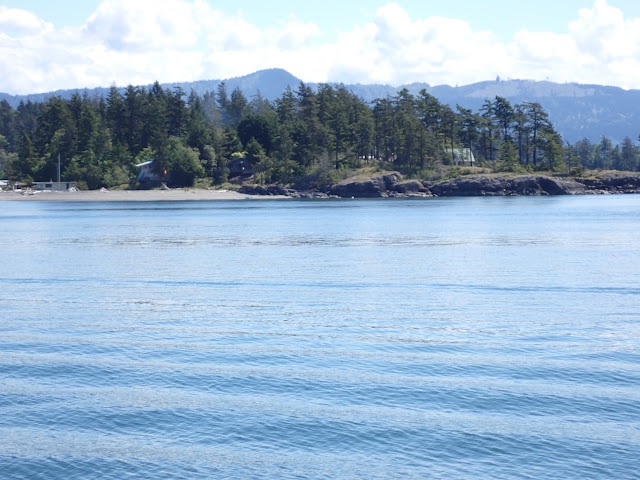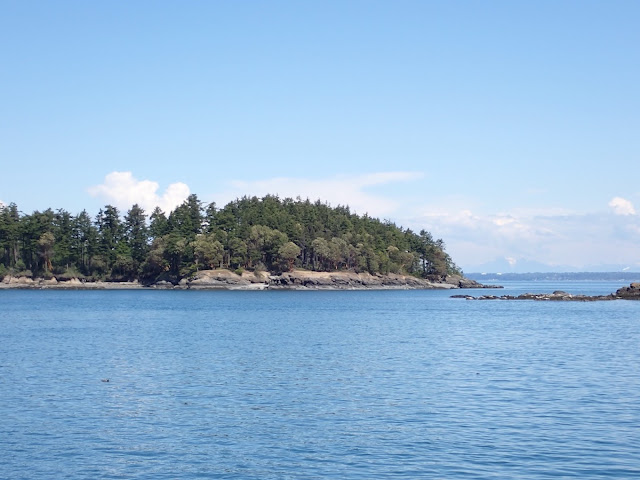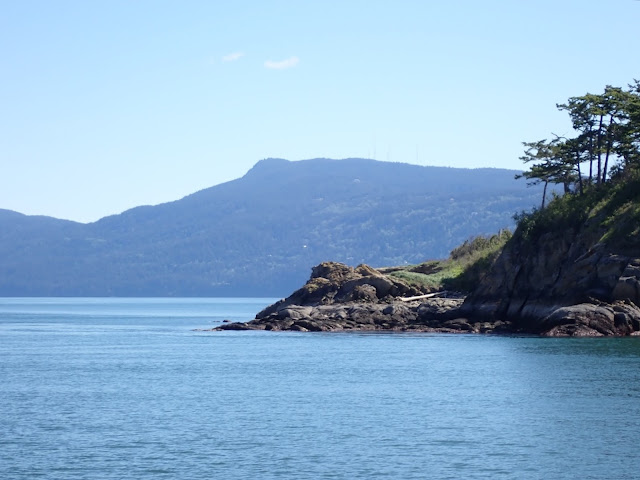31 August 2022
 It's been a busy summer, so my apologies for not posting blogs more frequently. As I said, it has just been busy!
It's been a busy summer, so my apologies for not posting blogs more frequently. As I said, it has just been busy!
I don't have any photos of our drive through Washington state - this is "home  base," so I no longer take any photos as we head to Bellingham. I guess the drive isn't exciting anymore.
base," so I no longer take any photos as we head to Bellingham. I guess the drive isn't exciting anymore.
We had a couple of
days in Yakima with my brother and family, always good to see them and
catch up. We  went through some boxes, constantly rotating items in our
storage unit. And that was about it.
went through some boxes, constantly rotating items in our
storage unit. And that was about it.
Then we drove on to
Bellingham and spent one night before heading to our rented house for
the summer, located in  Ferndale. More about that in another blog
(because it really is a cute house, and an interesting location).
Ferndale. More about that in another blog
(because it really is a cute house, and an interesting location).
But the very next day, Richard's brother and sister-in-law came to stay with us for a week. These are the people we stay 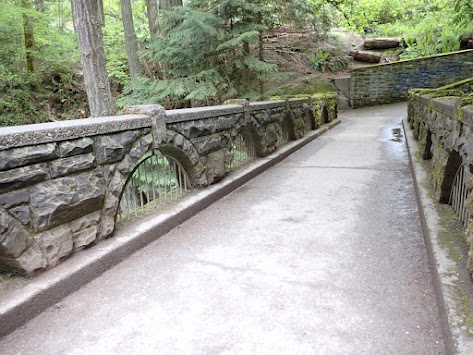 with in New Jersey, S & J. So this was our turn to host them.
with in New Jersey, S & J. So this was our turn to host them.
We did the usual family sorts of things, a lot of talking and catching up on how everyone is doing in the entire extended family, all the stories and gossip.

But we also did some exploring so they could enjoy the beauty of the Pacific Northwest, and in particular the Bellingham area.
Our first trip was out to Whatcom
Falls Park. One of the four original small towns that 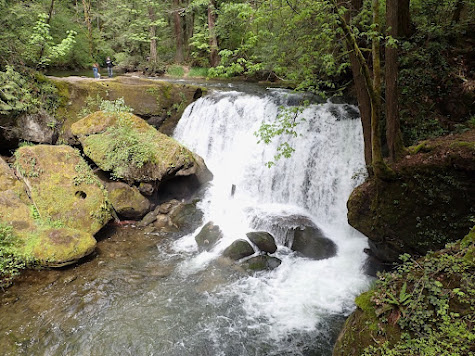 eventually merged
into Bellingham was called Whatcom, and Bellingham is located in
Whatcom County. Whatcom Creek runs from Lake Whatcom, through
Bellingham, and empties into Bellingham Bay, which is part of Puget
Sound
eventually merged
into Bellingham was called Whatcom, and Bellingham is located in
Whatcom County. Whatcom Creek runs from Lake Whatcom, through
Bellingham, and empties into Bellingham Bay, which is part of Puget
Sound  and/or the Salish Sea. (Yes, the names are a bit redundant with
all those Whatcoms!)
and/or the Salish Sea. (Yes, the names are a bit redundant with
all those Whatcoms!)
But it actually makes sense. "Whatcom" is Nooksack (one of the local Native
American Nations) for "noisy waters." So naming rather noisy waterfalls
using the local language is very reasonable! And then, naming the lake
where that river or creek originates is equally reasonable. I'm
guessing the original town of Whatcom also encompassed the falls.
Two
of the town's founding fathers went looking for waterfalls to run their
lumber mill, I would assume using waterwheels for power. The mill is
long gone, but salmon still swim upstream here to spawn, despite the
thirty-five foot drop.
It's an interesting
place to visit, with the stone arched bridge built as a WPA project
during the Depression, and this lovely waterfall. Not a huge waterfall,
but a nice size. People swim in the tranquil pool at the top of the
cascade during the warm summer months, but we visited in mid-May and
were not enticed.
We took a bit of a hike through the wooded
section of the park, maybe just half a mile or so. It was a bit of a
chilly day, threatening to rain, so we didn't go very far.
But we did encounter some very fragrant lilacs, my absolute favorite flower. That made it all worthwhile.
 Our next adventure
was a whale watching trip out in Bellingham Bay and on into the Salish
Sea. Because Puget Sound connects to the Straits of Georgia and the
Straits of Juan de Fuca in Canada, some people refer to the entire
waterway as the Salish Sea. Bellingham isn't really on Puget Sound,
because the town is located where the Sound and the two Straits come
together. It makes more sense on a map. (The map is borrowed from the
SeaDoc Society - their website info about the Salish Sea: www.seadocsociety.org/about-the-salish-sea.)
Our next adventure
was a whale watching trip out in Bellingham Bay and on into the Salish
Sea. Because Puget Sound connects to the Straits of Georgia and the
Straits of Juan de Fuca in Canada, some people refer to the entire
waterway as the Salish Sea. Bellingham isn't really on Puget Sound,
because the town is located where the Sound and the two Straits come
together. It makes more sense on a map. (The map is borrowed from the
SeaDoc Society - their website info about the Salish Sea: www.seadocsociety.org/about-the-salish-sea.)
We didn't cross the "border" with Canada, but we may have sailed in Canadian waters. I can't really say one way or the other.
However, we were very lucky and had a gorgeous day! It  was definitely chilly, but this huge inland sea was like a lake that day, calmer than I've ever seen it. The water was flat and glassy, like a mirror, with barely a ripple of a wave. Probably cold, but completely calm and flat.
was definitely chilly, but this huge inland sea was like a lake that day, calmer than I've ever seen it. The water was flat and glassy, like a mirror, with barely a ripple of a wave. Probably cold, but completely calm and flat.
 And there were only a few puffy little clouds on the edges of the sky - absolutely no clouds overhead. Really, an amazingly gorgeous day!
And there were only a few puffy little clouds on the edges of the sky - absolutely no clouds overhead. Really, an amazingly gorgeous day!
I have no idea how large the boat was, but there were roughly 100  passengers. Also a batch of crew members, the captain (and maybe a co-captain), and a naturalist on board. Plenty of room, although the upper deck above the cabin was full. I managed to find a place to sit out on the bow of the boat, because I really enjoy sitting
passengers. Also a batch of crew members, the captain (and maybe a co-captain), and a naturalist on board. Plenty of room, although the upper deck above the cabin was full. I managed to find a place to sit out on the bow of the boat, because I really enjoy sitting  outside while boating. And with a sweater under a down jacket, it was very comfortable despite the breeze.
outside while boating. And with a sweater under a down jacket, it was very comfortable despite the breeze.
At some point, the captain did announce that the bow was open for people who wanted to be outside, so my 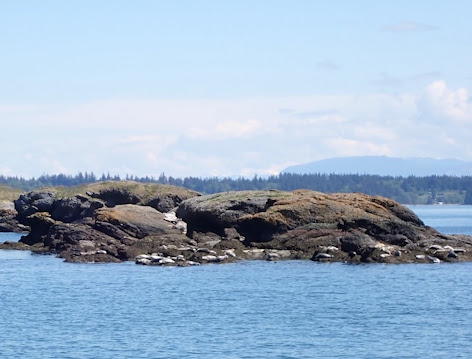 tranquil little space was soon busy. Some people came and went, because it does get windy up there from the speed of the boat. The other group that stayed out there for a long time turned out to be a group of Japanese students studying at the community college in Bellingham. Some of them spoke English more easily that others, but all were very polite and tried to help older people up and down from the platform we all were sitting on, enjoying the view and the sun.
tranquil little space was soon busy. Some people came and went, because it does get windy up there from the speed of the boat. The other group that stayed out there for a long time turned out to be a group of Japanese students studying at the community college in Bellingham. Some of them spoke English more easily that others, but all were very polite and tried to help older people up and down from the platform we all were sitting on, enjoying the view and the sun.
I don't remember the names of most of the islands we passed. But we did see a bald eagle flying overhead - you can see it in this photo, just slightly to the right of center, flying to the right. The eagle is the dark V-shaped blob in the sky. (If you click on the photo, it will enlarge, and you can see the white head and tail.
I have tons of scenic photos, but I know, you want to see the animals, right? We passed a group of rocks covered in seals - we stayed a distance away, so it was difficult to get a clear photo, but those grey to beige to brown colored blobs at the base of the rocky cliffs really are seals warming themselves in the sun.
 And then we encountered our whales!!!! Thrilling!!!
And then we encountered our whales!!!! Thrilling!!!
For years and years, most of the whales that were seen in the Salish Sea were orcas, or killer whales. They're called killer whales  because some pods eat seals or other whales.
because some pods eat seals or other whales.
The resident pods of orcas in the Salish Sea were living in large family groups, and would eat mostly salmon. But between the various dams on the rivers where  the salmon spawn, and climate change increasing the ocean temperatures, there have been fewer and fewer salmon. This in turn is affecting the orcas, and their numbers have been dwindling.
the salmon spawn, and climate change increasing the ocean temperatures, there have been fewer and fewer salmon. This in turn is affecting the orcas, and their numbers have been dwindling.
 However, another group of orcas moved in, and they hunt seals and other whales. They don't live in large pods, and they aren't as friendly as the resident orcas had been to humans and boats. Really, we've been on previous whale watching trips
However, another group of orcas moved in, and they hunt seals and other whales. They don't live in large pods, and they aren't as friendly as the resident orcas had been to humans and boats. Really, we've been on previous whale watching trips  where the orcas would swim under the boat and pop up on the other side. Or swim up and play, just showing off for the people. They were really amusing.
where the orcas would swim under the boat and pop up on the other side. Or swim up and play, just showing off for the people. They were really amusing.
But the hunting orcas don't do that - they ignore  boats, and hunt either alone or in pairs.
boats, and hunt either alone or in pairs.
With this change in climate and fish availability, as well as the shift in orcas within these waters, an entirely new whale showed up - a group of  humpback whales now make the Salish Sea their home! Humpbacks are usually pelagic, or ocean-going animals. The migrate from cold waters at both poles, to warm sub-tropical waters to mate and give birth. So it is quite odd to
humpback whales now make the Salish Sea their home! Humpbacks are usually pelagic, or ocean-going animals. The migrate from cold waters at both poles, to warm sub-tropical waters to mate and give birth. So it is quite odd to  see humpback whales right here Puget Sound (or whichever waterway we were in).
see humpback whales right here Puget Sound (or whichever waterway we were in).
We saw two orcas, which our naturalist told us most likely were a mother and son. You can tell the gender by the  dorsal fin - males have a really tall dorsal fin (the fin on their back), so large it almost looks like a large black sailboat. Females have a much smaller dorsal fin. This male's fin wasn't as large as a full-grown male's fin, so that's why the naturalist thought the pair probably were mother and son hunting together.
dorsal fin - males have a really tall dorsal fin (the fin on their back), so large it almost looks like a large black sailboat. Females have a much smaller dorsal fin. This male's fin wasn't as large as a full-grown male's fin, so that's why the naturalist thought the pair probably were mother and son hunting together.
Because they were in hunt mode, definitely chasing something as it zigzagged around in the water trying to evade them. We don't know if they were chasing a seal, or possibly a dolphin or porpoise, or maybe a large fish. But they were on the hunt.
We also saw a lone humpback, fortunately not near the hunting orcas. The humpback was just slowly swimming along, blowing some water from its blowhole in the signature spout. It would swim a bit, dive, resurface, and swim a bit. It never did flip its tail, though - the naturalist told us that the tail has the identifying marks to signify whether this whale is male or female, and many of marks show scientists exactly which humpback they are viewing.
What an experience! It was an amazing day! (It also included a very tasty lasagne lunch, complete with cookies for dessert.) If you've ever in Bellingham, sign up for a whale watching cruise with San Juan cruises - absolutely worth it! https://www.whales.com/
I'll end with some large photos of the whales, and a few scenic photos so you can see how calm the water was, and the green green islands.












